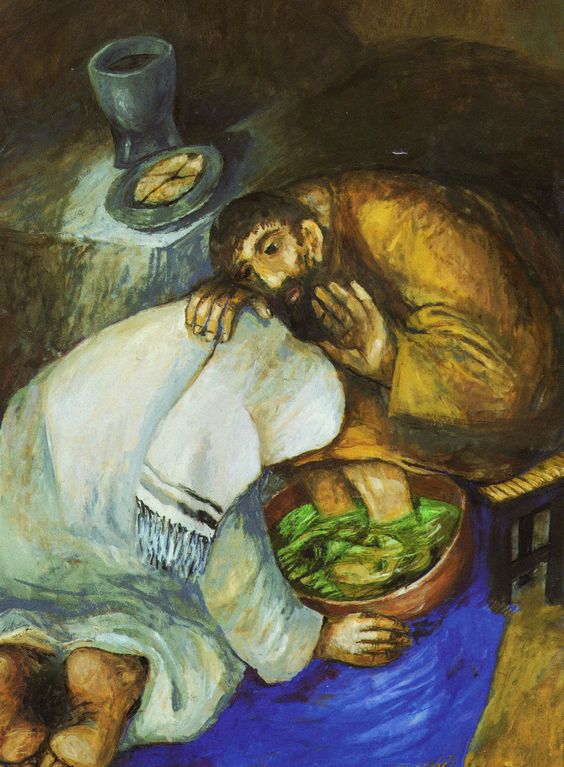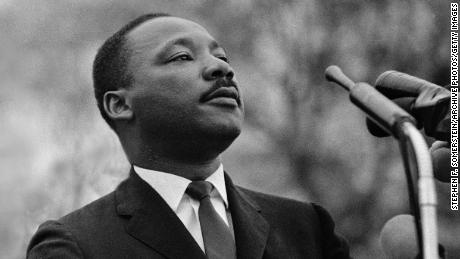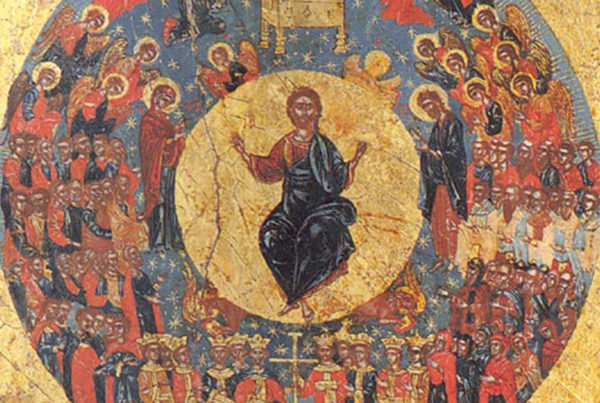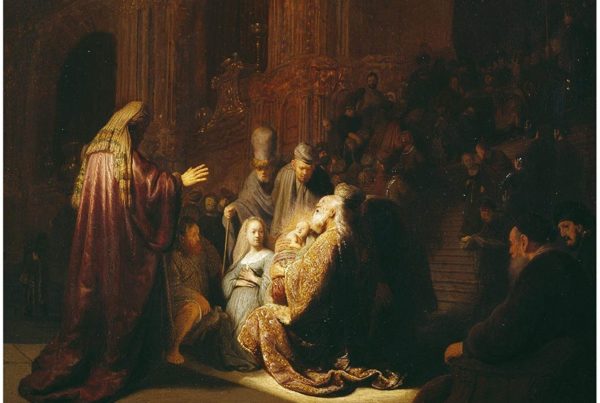The Son of God got up from the meal, according to John, took off his outer clothing, wrapped a towel around his waist, and began to wash the feet of his disciples – a scandalous and embarrassing act. The Jews of Jesus’ day were loathe to let even Jewish servants wash the feet of their masters. The act was too degrading. Save it for pagan slaves. Not our own.
And here is Jesus – yet again – smashing through the system. God of very God, disregarding the apparent insult of it all, literally “disrobed,” got down on his hands and knees, and lowered himself further even than a common servant.
The objection of Peter is understandably strong – “No, Lord!” But Jesus replies, “Unless I wash you, you have no part of me.”
Apparently, it is the humble love of Jesus that sanctifies, conquers, and reconciles the world. The washing of the feet foreshadows the events of the next 24 hours – the Son of God will climb the tree, spill his life in love for us, and the blood and water that pour that gruesome afternoon from his side will become a cataract of mercy that will one day engulf the world – sanctifying, conquering, reconciling.
///
I have seen it with my own eyes.
Years ago at our church in Denver, we hosted a Maundy Thursday “foot-washing” service. We worshiped. I preached on the “New Commandment” of Jesus (that’s where we get “Maundy” from – the “Mandatum Novum” – the “New Commandment” Jesus gives to love one another, as he loved). And then we began the footwashing.
An awkward and uncomfortable thing to do in any age – and especially, I suppose, in ours, since we are so unaccustomed to it. Each person lined up at a foot-washing station, having their feet washed, and then extending the grace of the moment to someone else by turning around and washing their feet.
Two individuals in our community who had once been best friends were in a heartbreaking relational standoff. Nothing any of us who knew them did seemed capable of mending it. So we did what you do – we entrusted it to the Mercy.
That night, those two individuals – quite randomly – wound up in the same foot-washing line. They could have ducked out of the moment if they wanted to. But I think they perceived the Mercy at work in it. So they stayed. And though they – and all of us with them – had struggled to find the way “home” to reconciliation, that night, as it turned out, the Mercy led them back to each other, back home.
They washed each other’s feet.
From across the room I watched it, and cried. A picture of the strife-conquering love of God.
Only God could do that, I thought.
That moment planted a seed of gentleness deep in the soil of that relationship. Over the course of the next months I watched it sprout and grow. Hostility died. Grace and generosity and genuine, mutual respect rose in them once again. Mercy triumphed over judgment.
Like it always does.
///
Jesus concluded his demonstration that night with his disciples by saying, “As I have done to do, so you do for one another. And you will be blessed if you do.”
We are those who follow Jesus. The Jesus who did not win the world by might or by power but by his humble love – a love that would rather die than kill – a love that would rather be bruised than bruise – a love that seeks nothing for itself but everything only ever and all for the other.
And so we are saved.
We live in an anxious, noisy, angry time, friends. It is easy to be swallowed up by it all. Aldous Huxley wrote:
The effects which follow too constant and intense a concentration upon evil are always disastrous. Those who crusade not for God in themselves, but against the devil in others, never succeed in making the world better, but leave it either as it was, or sometimes even perceptibly worse than it was before the crusade began. By thinking primarily of evil we tend, however excellent our intentions, to create occasions for evil to manifest itself.
Indeed. We see it all around us. Crusaders succumbing to the very evil they fight. The obsession backfires. Darkness wins.
But we are those who follow Jesus, friends. And so we do not succumb to the disaster of obsessing over evil – and then, inadvertently, becoming part of it. Rather, we let the Mercy conquer us. And then we carry the Mercy out into the world.
And we wait and watch as the Mercy marches around every Jericho, conquering it with kindness. The walls will fall. They always do.
///
But the Mercy must – it MUST – conquer us first. We must let Jesus love us – even when that love scandalizes and embarrasses us – as it must if it is to touch us in the deepest places. From there we will rise in strength to be a people of the Mercy, of humble, peace-making love for a world of strife and fear.
So we must face the Mercy as often as we can, letting it plant seeds of gentleness in our souls. Mother Teresa was fond of saying:
The fruit of silence is prayer
The fruit of prayer is faith
The fruit of faith is love
The fruit of love is service
The fruit of service is peace
It was reported of Teresa that often, when the work of the Missionaries of Charity threatened to crush her, she would withdraw to prayer, in simple adoration of the Lord who spilled his life for her and for the poor she served, and walk out visibly taller – emboldened by the Love that thought it no insult to love humanity to the uttermost.
So let us be – emboldened by the Kindness – strengthened by the Mercy – made courageous once more by the deep, deep love of the Lord Jesus Christ.
Peace be with you,
Andrew





